- Home
- Carolyn Wells
The Mystery of the Sycamore
The Mystery of the Sycamore Read online
Produced by Mardi Desjardins, Stephen Hutcheson, and theonline Distributed Proofreaders Canada team athttps://www.pgdpcanada.net
THE MYSTERY OF THE SYCAMORE
By CAROLYN WELLS
Author of _“The Vanishing of Betty Varian,” “The Mystery Girl,” “Anybody But Anne,” “The Come-Back,” “The Curved Blades,” “A Chain of Evidence,” “In the Onyx Lobby,” “The Luminous Face,” “Raspberry Jam,” etc_.
A. L. BURT COMPANY Publishers New York
Published by arrangement with J. B. Lippincott Company Printed in U. S. A.
COPYRIGHT, 1920, BY STREET & SMITH CORPORATION, UNDER TITLE OF “THE PARDON TREE” COPYRIGHT, 1921, BY J. B. LIPPINCOTT COMPANY
CONTENTS
CHAPTER PAGE I. The Letter that Said Come 9 II. North Door and South Door 28 III. One Last Argument 47 IV. The Big Sycamore Tree 65 V. The Bugle Sounded Taps 83 VI. The Other Heir 101 VII. Inquiries 119 VIII. Confession 137 IX. Counter-Confessions 155 X. The Phantom Bugler 173 XI. Fleming Stone 191 XII. The Garage Fire 209 XIII. Sara Wheeler 227 XIV. Rachel’s Story 245 XV. The Awful Truth 263 XVI. Maida’s Decision 281 XVII. Maida and Her Father 299 XVIII. A Final Confession 317
THE MYSTERY OF THE SYCAMORE
CHAPTER I THE LETTER THAT SAID COME
As the character of a woman may be accurately deduced from herhandkerchief, so a man’s mental status is evident from the way he openshis mail.
Curtis Keefe, engaged in this daily performance, slit the envelopesneatly and laid the letters down in three piles. These divisionsrepresented matters known to be of no great interest; matters known to beimportant; and, third, letters with contents as yet unknown and thereforeof problematical value.
The first two piles were, as usual, dispatched quickly, and the realattention of the secretary centred with pleasant anticipation on thethird lot.
“Gee whiz, Genevieve!”
As no further pearls of wisdom fell from the lips of the engrossed readerof letters, the stenographer gave him a round-eyed glance and thencontinued her work.
Curtis Keefe was, of course, called Curt by his intimates, and while itmay be the obvious nickname was brought about by his short and concisemanner of speech, it is more probable that the abbreviation was largelyresponsible for his habit of curtness.
Anyway, Keefe had long cultivated a crisp, abrupt style of conversation.That is, until he fell in with Samuel Appleby. That worthy ex-governor,while in the act of engaging Keefe to be his confidential secretary,observed: “They call you Curt, do they? Well, see to it that it is shortfor courtesy.”
This was only one of several equally sound bits of advice from the samesource, and as Keefe had an eye single to the glory of self-advancement,he kept all these things and pondered them in his heart.
The result was that ten years of association with Lawyer Appleby hadgreatly improved the young man’s manner, and though still brief ofspeech, his curtness had lost its unpleasantly sharp edge and hiscourtesy had developed into a dignified urbanity, so that though stillCurt Keefe, it was in name only.
“What’s the pretty letter all about, Curtie?” asked the observantstenographer, who had noticed his third reading of the short missive.
“You’ll probably answer it soon, and then you’ll know,” was the reply, asKeefe restored the sheet to its envelope and took up the next letter.
Genevieve Lane produced her vanity-case, and became absorbed in itspossibilities.
“I wish I didn’t have to work,” she sighed; “I wish I was an operasinger.”
“‘Cromwell, I charge thee, fling away ambition,’ murmured Keefe, his eyesstill scanning letters; ‘by that sin fell the angels,’ and it’s true youare angelic, Viva, so down you’ll go, if you fall for ambition.”
“How you talk! Ambition is a good thing.”
“Only when tempered by common sense and perspicacity—neither of which youpossess to a marked degree.”
“Pooh! You’re ambitious yourself, Curt.”
“With the before-mentioned qualifications. Look here, Viva, here’s a linefor you to remember. I ran across it in a book. ‘If you do only what isabsolutely correct and say only what is absolutely correct—you can doanything you like.’ How’s that?”
“I don’t see any sense in it at all.”
“No? I told you you lacked common sense. Most women do.”
“Huh!” and Genevieve tossed her pretty head, patted her curly ear-muffs,and proceeded with her work.
Samuel Appleby’s beautiful home graced the town of Stockfield, in thewestern end of the Commonwealth of Massachusetts. Former Governor Applebywas still a political power and a man of unquestioned force andimportance.
It was fifteen years or more since he had held office, and now, a greatdesire possessed him that his son should follow in his ways, and that hisbeloved state should know another governor of the Appleby name.
And young Sam was worthy of the people’s choice. Himself a man of forty,motherless from childhood, and brought up sensibly and well by hisfather, he listened gravely to the paternal plans for the campaign.
But there were other candidates, and not without some strong and definiteinfluences could the end be attained.
Wherefore, Mr. Appleby was quite as much interested as his secretary inthe letter which was in the morning’s mail.
“Any word from Sycamore Ridge?” he asked, as he came into the big,cheerful office and nodded a kindly good-morning to his two assistants.
“Yes, and a good word,” returned Keefe, smiling. “It says: ‘Come.’” Thesecretary’s attitude toward his employer, though deferential andrespectful, was marked by a touch of good-fellowship—a not unnaturaloutgrowth of a long term of confidential relations between them. Keefehad made himself invaluable to Samuel Appleby and both men knew it. So,as one had no desire to presume on the fact and the other no wish toignore it, serenity reigned in the well-ordered and well-appointedoffices of the ex-governor.
Even the light-haired, light-hearted and light-headed Genevieve couldn’tdisturb the even tenor of the routine. If she could have, she would havebeen fired.
Though not a handsome man, not even to be called distinguished looking,Samuel Appleby gave an impression of power. His strong, lean facebetokened obdurate determination and implacable will.
Its deep-graven lines were the result of meeting many obstacles andsurmounting most of them. And at sixty-two, the hale and hearty frame andthe alert, efficient manner made the man seem years younger.
“You know the conditions on which Wheeler lives in that house?” Applebyasked, as he looked ove
r the top of the letter at Keefe.
“No, sir.”
“Well, it’s this way. But, no—I’ll not give you the story now. We’regoing down there—to-day.”
“The whole tribe?” asked Keefe, briefly.
“Yes; all three of us. Be ready, Miss Lane, please, at three-thirty.”
“Yes, sir,” said Genevieve, reaching for her vanity-box.
“And now, Keefe, as to young Sam,” Appleby went on, running his fingersthrough his thick, iron-gray mane. “If he can put it over, or if I canput it over for him, it will be only with the help of Dan Wheeler.”
“Is Wheeler willing to help?”
“Probably not. He must be made willing. I can do it—I think—unless heturns stubborn. I know Wheeler—if he turns stubborn—well, Balaam’shistoric quadruped had nothing on him!”
“Does Mr. Wheeler know Sam?”
“No; and it wouldn’t matter either way if he did. It’s the platformWheeler stands on. If I can keep him in ignorance of that one plank——”
“You can’t.”
“I know it—confound it! He opposed my election on that one point—he’lloppose Sam’s for the same reason, I know.”
“Where do I come in?”
“In a general way, I want your help. Wheeler’s wife and daughter areattractive, and you might manage to interest them and maybe sway theirsympathies toward Sam——”
“But they’ll stand by Mr. Wheeler?”
“Probably—yes. However, use your head, and do all you can with it.”
“And where do I come in?” asked Genevieve, who had been an interestedlistener.
“You don’t come in at all, Miss. You mostly stay out. You’re to keep inthe background. I have to take you, for we’re only staying one night atSycamore Ridge, and then going on to Boston, and I’ll need you there.”
“Yes, sir,” and the blue eyes turned from him and looked absorbedly intoa tiny mirror, as Genevieve contemplated her pleasant pink-and-whiteness.
Her vanity and its accompanying box were matters of indifference to Mr.Appleby and to Keefe, for the girl’s efficiency and skill outweighed themand her diligence and loyalty scored one hundred per cent.
Appleby’s fetish was efficiency. He had found it and recognized it in hissecretary and stenographer and he was willing to recompense it duly, evengenerously. Wherefore the law business of Samuel Appleby, though carriedon for the benefit of a small number of clients, was of vast importanceand productive of lucrative returns.
At present, the importance was overshadowed by the immediate interest ofa campaign, which, if successful would land the second Appleby in thegubernatorial chair. This plan, as yet not a boom, was taking shape withthe neatness and dispatch that characterized the Appleby work.
Young Sam was content to have the matter principally in his father’shands, and things had reached a pitch where, to the senior mind, thecoöperation of Daniel Wheeler was imperatively necessary.
And, therefore, to Wheeler’s house they must betake themselves.
“What do you know about the Wheeler business, kid?” Keefe inquired, afterMr. Appleby had left them.
Genevieve leaned back in her chair, her dimpled chin moving up and downwith a pretty rhythm as she enjoyed her chewing-gum, and gazed at theceiling beams.
Appleby’s offices were in his own house, and the one given over to thesetwo was an attractive room, fine with mahogany and plate glass, but alsoprovided with all the paraphernalia of the most up-to-date of officefurniture. There were good pictures and draperies, and a wood fire addedto the cheer and mitigated the chill of the early fall weather.
Sidling from her seat, Miss Lane moved over to a chair near the fire.
“I’ll take those letters when you’re ready,” she said. “Why, I don’t knowa single thing about any Wheeler. Do you?”
“Not definitely. He’s a man who had an awful fight with Mr. Appleby, longago. I’ve heard allusions to him now and then, but I know no details.”
“I, either. But, it seems we’re to go there. Only for a night, and then,on to Boston! Won’t I be glad to go!”
“We’ll only be there a few days. I’m more interested in this Wheelerperformance. I don’t understand it. Who’s Wheeler, anyhow?”
“Dunno. If Sammy turns up this morning, he may enlighten us.”
Sammy did turn up, and not long after the conversation young Applebystrolled into the office.
Though still looked upon as a boy by his father, the man was of hugeproportions and of an important, slightly overbearing attitude.
Somewhat like his parent in appearance, young Sam, as he was alwayscalled, had more grace and ease, if less effect of power. He smiledgenially and impartially; he seemed cordial and friendly to all theworld, and he was a general favorite. Yet so far he had achieved no greatthing, had no claim to any especial record in public or private life.
At forty, unmarried and unattached, his was a case of an able mentalityand a firm, reliable character, with no opportunity offered to prove itsworth. A little more initiative and he would have made opportunities forhimself; but a nature that took the line of least resistance, aphilosophy that believed in a calm acceptance of things as they came,left Samuel Appleby, junior, pretty much where he was when he began. Ifno man could say aught against him, equally surely no man could sayanything very definite for him. Yet many agreed that he was a man whosepowers would develop with acquired responsibilities, and already he had afollowing.
“Hello, little one,” he greeted Genevieve, carelessly, as he sat downnear Keefe. “I say, old chap, you’re going down to the Wheelers’ to-day,I hear.”
“Yes; this afternoon,” and the secretary looked up inquiringly.
“Well, I’ll tell you what. You know the governor’s going there to getWheeler’s aid in my election boom, and I can tell you a way to helpthings along, if you agree. See?”
“Not yet, but go ahead.”
“Well, it’s this way. Dan Wheeler’s daughter is devoted to her father.Not only filial respect and all that, but she just fairly idolizes theold man. Now, he recips, of course, and what she says goes. So—I’m askingyou squarely—won’t you put in a good word to Maida, that’s the girl—andif you do it with your inimitable dexterity and grace, she’ll fall forit.”
“You mean for me to praise you up to Miss Wheeler and ask her father togive you the benefit of his influence?”
“How clearly you do put things! That’s exactly what I mean. It’s no harm,you know—merely the most innocent sort of electioneering——”
“Rather!” laughed Keefe. “If all electioneering were as innocent as that,the word would carry no unpleasant meaning.”
“Then you’ll do it?”
“Of course I will—if I get opportunity.”
“Oh, you’ll have that. It’s a big, rambling country house—a delightfulone, too—and there’s tea in the hall, and tennis on the lawn, andmoonlight on the verandas——”
“Hold up, Sam,” Keefe warned him, “is the girl pretty?”
“Haven’t seen her for years, but probably, yes. But that’s nothing toyou. You’re working for me, you see.” Appleby’s glance was direct, andKeefe understood.
“Of course; I was only joking. I’ll carry out your commission, if, as Isaid, I get the chance. Tell me something of Mr. Wheeler.”
“Oh, he’s a good old chap. Pathetic, rather. You see, he bumped upagainst dad once, and got the worst of it.”
“How?”
Sam Appleby hesitated a moment and then said: “I see you don’t know thestory. But it’s no secret, and you may as well be told. You listen, too,Miss Lane, but there’s no call to tattle.”
“I’ll go home if you say so,” Genevieve piped up, a little crisply.
“No, sit still. Why, it was while dad was governor—about fifteen yearsago, I suppose. And Daniel Wheeler forged a paper—that is, he said hedidn’t, but twelve other good and true peers of his said he did. Anyway,he was convicted and sentenced, but father
was a good friend of his, andbeing governor, he pardoned Wheeler. But the pardon was on condition—oh,I say—hasn’t dad ever told you, Keefe?”
“Never.”
“Then, maybe I’d better leave it for him to tell. If he wants you to knowhe’ll tell you, and if not, I mustn’t.”
“Oh, goodness!” cried Genevieve. “What a way to do! Get us all excitedover a thrilling tale, and then chop it off short!”
“Go on with it,” said Keefe; but Appleby said, “No; I won’t tell you thecondition of the pardon. But the two men haven’t been friends since, andwon’t be, unless the condition is removed. Of course, dad can’t do it,but the present governor can make the pardon complete, and would do so ina minute, if dad asked him to. So, though he hasn’t said so, theassumption is, that father expects to trade a full pardon of FriendWheeler for his help in my campaign.”
“And a good plan,” Keefe nodded his satisfaction.
“But,” Sam went on, “the trouble is that the very same points andprinciples that made Wheeler oppose my father’s election will make himoppose mine. The party is the same, the platform is the same, and I can’thope that the man Wheeler is not the same stubborn, adamant, unbreakableold hickory knot he was the other time.”
“And so, you want me to soften him by persuading his daughter to line upon our side?”
“Just that, Keefe. And you can do it, I am sure.”
“I’ll try, of course; but I doubt if even a favorite daughter couldinfluence the man you describe.”
“Let me help,” broke in the irrepressible Genevieve. “I can do lots witha girl. I can do more than Curt could. I’ll chum up with her and——”
“Now, Miss Lane, you keep out of this. I don’t believe in mixing womenand politics.”
“But Miss Wheeler’s a woman.”
“And I don’t want her troubled with politics. Keefe here can persuade herto coax her father just through her affections—I don’t want herenlightened as to any of the political details. And I can’t think yourinfluence would work half as well as that of a man. Moreover, Keefe hasdiscernment, and if it isn’t a good plan, after all, he’ll know enough todiscard it—while you’d blunder ahead blindly, and queer the whole game!”
“Oh, well,” and bridling with offended pride, Genevieve sought refuge inher little mirror.
“Now, don’t get huffy,” and Sam smiled at her; “you’ll probably find thatMiss Wheeler’s complexion is finer than yours, anyway, and then you’llhate her and won’t want to speak to her at all.”
Miss Lane flashed an indignant glance and then proceeded to go on withher work.
“Hasn’t Wheeler tried for a pardon all this time?” Keefe asked.
“Indeed he has,” Sam returned, “many times. But you see, thoughsuccessive governors were willing to grant it, father always managed toprevent it. Dad can pull lots of wires, as you know, and since he doesn’twant Wheeler fully pardoned, why, he doesn’t get fully pardoned.”
“And he lives under the stigma.”
“Lots of people don’t know about the thing at all. He lives—well—he livesin Connecticut—and—oh, of course, there is a certain stigma.”
“And your father will bring about his full pardon if he promises——”
“Let up, Keefe; I’ve said I can’t tell you that part—you’ll get yourinstructions in good time. And, look here, I don’t mean for you to makelove to the girl. In fact, I’m told she has a suitor. But you’re just togive her a little song and dance about my suitability for the election,and then adroitly persuade her to use her powers of persuasion with herstubborn father. For he will be stubborn—I know it! And there’s themother of the girl . . . tackle Mrs. Wheeler. Make her see that my fatherwas justified in the course he took—and besides, he was more or lessaccountable to others—and use as an argument that years have dulled theold feud and that bygones ought to be bygones and all that.
“Try to make her see that a full pardon now will be as much, and in a waymore, to Wheeler’s credit, than if it had been given him at first——”
“I can’t see that,” and Keefe looked quizzical
“Neither can I,” Sam confessed, frankly, “but you can make a womanswallow anything.”
“Depends on what sort of woman Mrs. Wheeler is,” Keefe mused.
“I know it. I haven’t seen her for years, and as I remember, she’s prettykeen, but I’m banking on you to put over some of your clever work. Notthree men in Boston have your ingenuity, Keefe, when it comes to sizingup a situation and knowing just how to handle it. Now, don’t tell fatherall I’ve said, for he doesn’t especially hold with such small measures.He’s all for the one big slam game, and he may be right. But I’m right,too, and you just go ahead.”
“All right,” Keefe agreed. “I see what you mean, and I’ll do all I canthat doesn’t in any way interfere with your father’s directions to me.There’s a possibility of turning the trick through the women folks, andif I can do it, you may count on me.”
“Good! And as for you, Miss Lane, you keep in the background, and make aslittle mischief as you can.”
“I’m not a mischief-maker,” said the girl, pouting playfully, for she wasnot at all afraid of Sam Appleby.
“Your blue eyes and pink cheeks make mischief wherever you go,” hereturned; “but don’t try them on old Dan Wheeler. He’s a morose oldchap——”
“I should think he would be!” defended Genevieve; “living all these yearsunder a ban which may, after all, be undeserved! I’ve heard that he wasentirely innocent of the forgery!”
“Have you, indeed?” Appleby’s tone was unpleasantly sarcastic. “Otherpeople have also heard that—from the Wheeler family! Those betterinformed believe the man guilty, and believe, too, that my father was toolenient when he granted even a conditional pardon.”
“But just think—if he was innocent—how awful his life has been all theseyears! You bet he’ll accept the full pardon and give all his effort andinfluence and any possible help in return.”
“Hear the child orate!” exclaimed Sam, gazing at the enthusiastic littleface, as Genevieve voiced her views.
“I think he’ll be ready to make the bargain, too,” declared Keefe. “Yourfather has a strong argument. I fancy Wheeler’s jump at the chance.”
“Maybe—maybe so. But you don’t know how opposed he is to our principles.And he’s a man of immovable convictions. In fact, he and dad are twomighty strong forces. One or the other must win out—but I’ve no ideawhich it will be.”
“How exciting!” Genevieve’s eyes danced. “I’m so glad I’m to go. It’s apretty place, you say?”
“Wonderful. A great sweep of rolling country, a big, long, rambling sortof house, and a splendid hospitality. You’ll enjoy the experience, butremember, I told you to be good.”
“I will remember,” and Genevieve pretended to took cherubic.

 The Deep Lake Mystery
The Deep Lake Mystery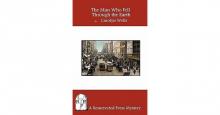 The Man Who Fell Through the Earth
The Man Who Fell Through the Earth The Mystery of the Sycamore
The Mystery of the Sycamore The Mystery Girl
The Mystery Girl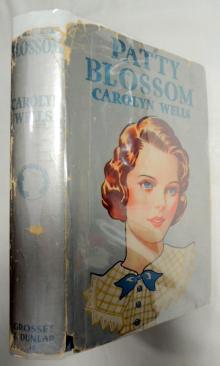 Patty Blossom
Patty Blossom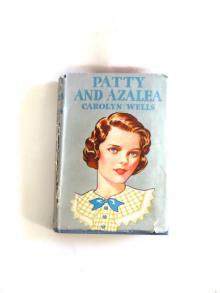 Patty and Azalea
Patty and Azalea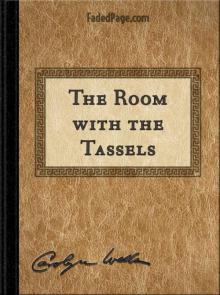 The Room with the Tassels
The Room with the Tassels The Vanishing of Betty Varian
The Vanishing of Betty Varian Murder in the Bookshop
Murder in the Bookshop The Staying Guest
The Staying Guest The Curved Blades
The Curved Blades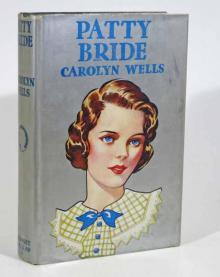 Patty—Bride
Patty—Bride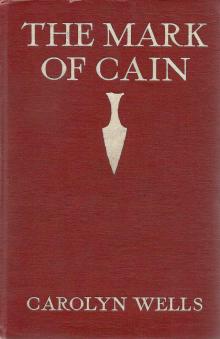 The Mark of Cain
The Mark of Cain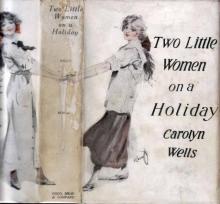 Two Little Women on a Holiday
Two Little Women on a Holiday Marjorie's New Friend
Marjorie's New Friend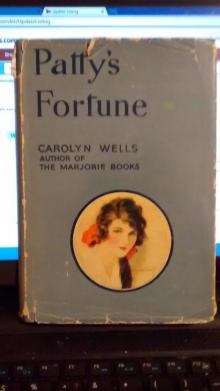 Patty's Fortune
Patty's Fortune Patty's Social Season
Patty's Social Season Patty in Paris
Patty in Paris The Diamond Pin
The Diamond Pin The Come Back
The Come Back The Dorrance Domain
The Dorrance Domain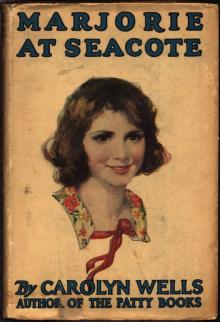 Marjorie at Seacote
Marjorie at Seacote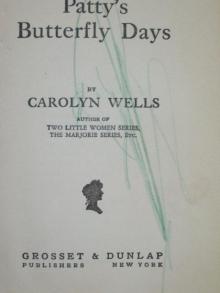 Patty's Butterfly Days
Patty's Butterfly Days Patty's Motor Car
Patty's Motor Car Patty's Success
Patty's Success Patty's Suitors
Patty's Suitors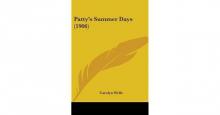 Patty's Summer Days
Patty's Summer Days Two Little Women
Two Little Women Patty Fairfield
Patty Fairfield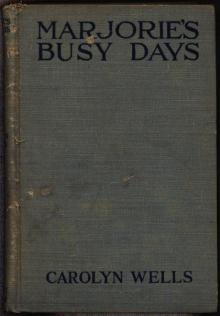 Marjorie's Busy Days
Marjorie's Busy Days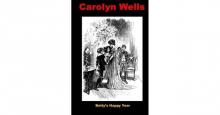 Betty's Happy Year
Betty's Happy Year In the Onyx Lobby
In the Onyx Lobby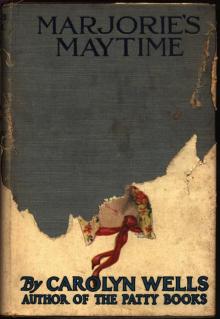 Marjorie's Maytime
Marjorie's Maytime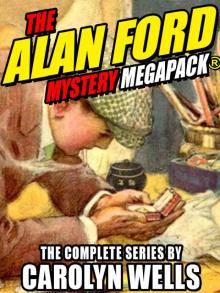 The Alan Ford Mystery MEGAPACK®
The Alan Ford Mystery MEGAPACK® The Gold Bag
The Gold Bag The Clue
The Clue The Gold Bag : A Fleming Stone Mystery
The Gold Bag : A Fleming Stone Mystery